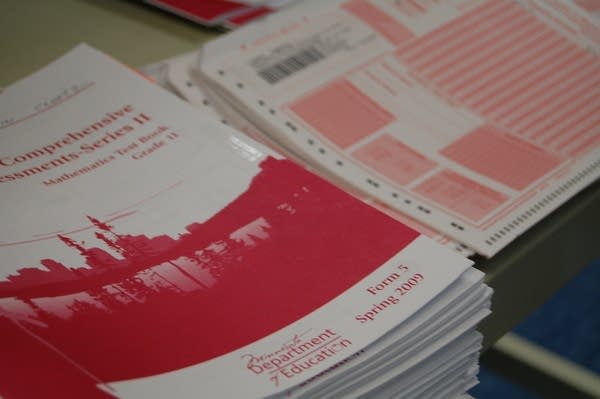Number of snow days worries rural school districts over testing
Go Deeper.
Create an account or log in to save stories.
Like this?
Thanks for liking this story! We have added it to a list of your favorite stories.

It was a tough winter across the state, and for many rural Minnesota school districts that resulted in lots of weather cancellations.
The words "snow day" may be one of the sweetest combinations any student can hear, but they cause major headaches for school administrators. During this year's tough winter, many rural Minnesota school districts repeatedly cancelled school.
Now some school officials worry that all those closures could hurt student scores on the Minnesota Comprehensive Assessment tests in April and May. That's particularly the case for school administrators in rural western Minnesota, whose districts -- like many in Minnesota -- cover hundreds of square miles.
"I've had more school-related closings and late starts than I've had in my whole previous career as a superintendent," Alexandria School District Superintendent Rick Lahn said.
Turn Up Your Support
MPR News helps you turn down the noise and build shared understanding. Turn up your support for this public resource and keep trusted journalism accessible to all.
Blizzards and ice storms can make it downright dangerous for buses to navigate country roads, prompting officials to call off school altogether during bad weather.
Most rural school districts can count on at least one or two snow days a year, but there have been so many this year that superintendents are worried how it will affect their students' performance on the high stakes testing this spring.
Montevideo Superintendent Luther Heller said teachers tell him they're behind in preparing students for MCAs.

"We're very fearful that this will have an impact on how we perform on it," Heller said. "That we will have some students that won't do as well as they would have, had we gotten all of the instructional time in that was possible to get in."
Because of the snow days, Heller has had to eliminate some of the district's scheduled days off so students have more time to prepare for the tests.
Other rural districts say they will provide tutoring to students to prepare them ready for the MCAs.
Officials in the Morris School district pushed some of testing in May back by a week, to give students and teachers time to catch up after the disruptions of several snow days and late starts.
"A week matters," Morris High School principal Craig Peterson said. "Five more days of instruction matters, it matters for our kids."
Such efforts show just how nervous school officials can get around the results of MCA tests.
"I've had more school-related closings and late starts than I've had in my whole previous career as a superintendent."
That's because the tests truly are high stakes. State education officials judge schools on how well students perform on the tests. Older students need to pass the reading and writing portions to get their diplomas. They can still get a diploma if they fail the math portion, although they need to finish other projects that show math competency.
That's why the state allows schools to give many of their tests in windows that range from March until May, said Charlene Briner, chief of staff at the Minnesota Department of Education.
"Those windows are designed to give districts flexibility because we recognize there can be floods, there can be snow days, there can be outbreaks of illness," Briner said. "So we really want to offer districts an opportunity to schedule the testing to meet their needs."
Some Minnesota superintendents say something else would help them in years like this: the ability to start school before Labor Day.
Heller, the Montevideo superintendent, said that would give students more time to prepare for MCAs, especially in years with lots of school closures.
"Even if a district were to be able to start four, five, six days earlier and get more instructional time in prior to the MCAs -- that flexibility would be helpful," he said.
Minnesota law now requires schools to start after the Labor Day. But 30 districts, including Minneapolis and two dozen in southwest Minnesota, have special waivers to start early.
A bill in the K-12 education omnibus bill at the Capitol this session would allow schools to start before the end of the summer season. The issue has come up many times before, but has failed after opposition from the state's tourism industry.
Editor's note: An earlier version of this story incorrectly stated that students must pass the math portion of the Minnesota Comprehensive Assessment tests to graduate from high school. The current version clarifies that if students fail the math portion, they can still graduate if they prove their competency in math by other means.




